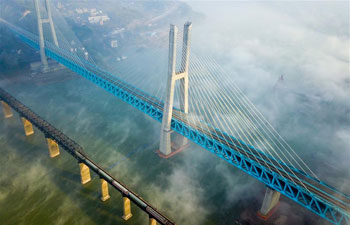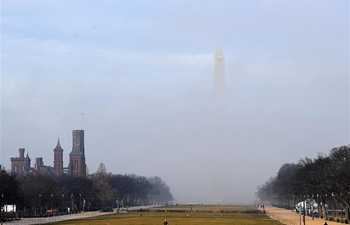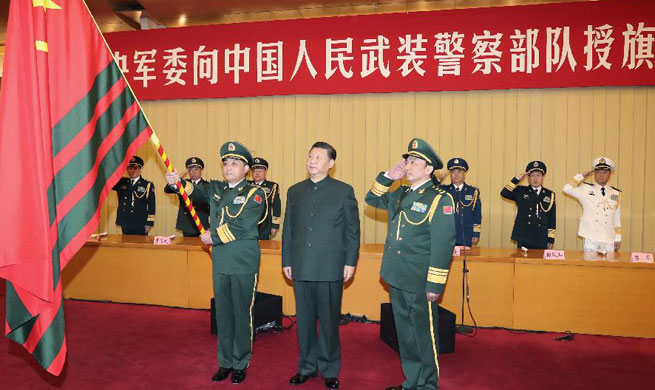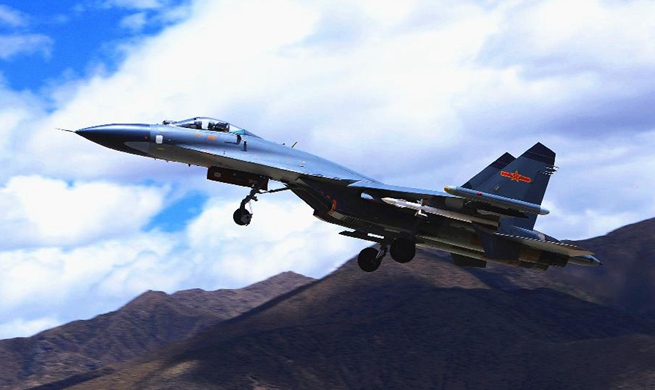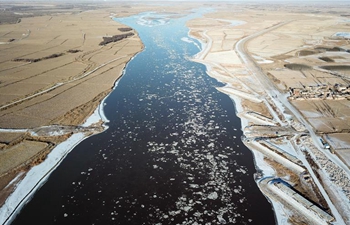By Keren Setton
JERUSALEM, Jan. 11 (Xinhua) -- The Israeli navy plays a major role in the country's defense, although it has enjoyed less of the limelight that other units in the Israeli Defense Forces (IDF) have.
The navy is the smallest unit of the IDF, with tens of marine vessels at service.
But it is responsible for protecting Israel's Exclusive Economic Zone (EEZ) and is also tasked with safeguarding newly found natural gas reserves and curbing potential threats from the Gaza Strip in the south of the country and Lebanon in the north.
"We face unique threats in our unique environment," a senior Israeli navy commander told Xinhua exclusively.
At the end of 2010, large natural gas reserves were found off Israel's coast, marking a strategic change for the energy-dependent nation.
The discovery also marks the beginning of a new job for the navy - protecting the oil rigs which could easily become a target for many of the country's hostile neighbors.
"The potential damage to the economy is huge," said the senior officer. "We are learning from other navies on how to protect gas rigs but we also have to develop our own concept."
Israel, which has purchased corvette warships from Germany, has reportedly changed their design in order to enhance its missile defense abilities.
According to the senior commander, the corvettes will be tasked with protecting the rigs around the clock.
Some of the vessels are armed with the "Protector," an unmanned surface vehicle (USV) developed to launch ammunition and conduct surveillance and interception missions.
"We have built a concept of layers on how to defend the gas rigs - navy, air force, intelligence and protection on board the gas rigs," the officer told Xinhua.
Late last year, the navy tested a missile interceptor system - Tamir Adir - aiming at shooting down short-range missiles. According to the IDF spokesperson, the test was successful.
Similar to other units in the army, the navy has realized it needs to look outwards in order to develop.
"The trend in the world is to work in coalitions. So we are expanding our exercises, to do not only bilateral exercises, but also multilateral ones... you can learn more and do more," said the senior commander.
The Israeli navy holds regular drills with its U.S., Greek, Italian and Cypriot counterparts. There is also cooperation with NATO.
While the Mediterranean is a favorable path for many refugees from the Middle East to flee to Europe, they do not pass through Israel's territorial waters - leaving the navy to sit out on this thorny matter.
But the waters of the Gaza Strip are different.
Israel left the territory in 2005 but retained control of the waters citing security concerns. Navy patrol boats are often seen off the Gaza coast.
In recent years, the Israeli navy has allowed for the expansion of the fishing area during high seasons.
"We have to maintain the balance all the time," the senior commander told Xinhua. "We know it is very important for them to fish, for their economy. They need it - on one hand. On the other hand, they are smuggling weapons and parts for building rockets."
Israel, together with Egypt, has imposed a strict land, air and sea blockade on the Gaza Strip from 2007, when Hamas took over the enclave. Hamas, which refuses to recognize Israel, is continuously arming itself for the next confrontation with Israel. The two sides fought their last war in 2014.
In addition to the corvettes, Israel has also purchased submarines from Germany. The last of the six vessels purchased is expected to be delivered later this year. This will give the small country unprecedented maritime forces.
The submarine deal with Germany was marred by controversy and a criminal investigation against officials close to Israel's Prime Minister Benjamin Netanyahu over suspected corruption and bribery in the multi-million-dollar transaction.
According to foreign media reports, the navy is tasked with the country's nuclear second-strike capabilities. Such a strike would be carried out by a submarine. Israel has never confirmed it possesses nuclear weapons.
Once receiving the submarines, the Israeli army fits it with its own combat systems, making them operational.
"We have a lot of knowledge, it is all our planning, tailor-made for us. We prefer not to be dependent on anyone," said the senior navy officer.
With a variety of tasks, the Israeli navy has maintained a relatively small but highly sophisticated force. Its elite units are known in the country for their rigorous and highly intense training.
"We have to secure our borders, because in minutes our enemies will be on our shores, in our power plants and on our gas rigs," the senior navy commander summarized.






